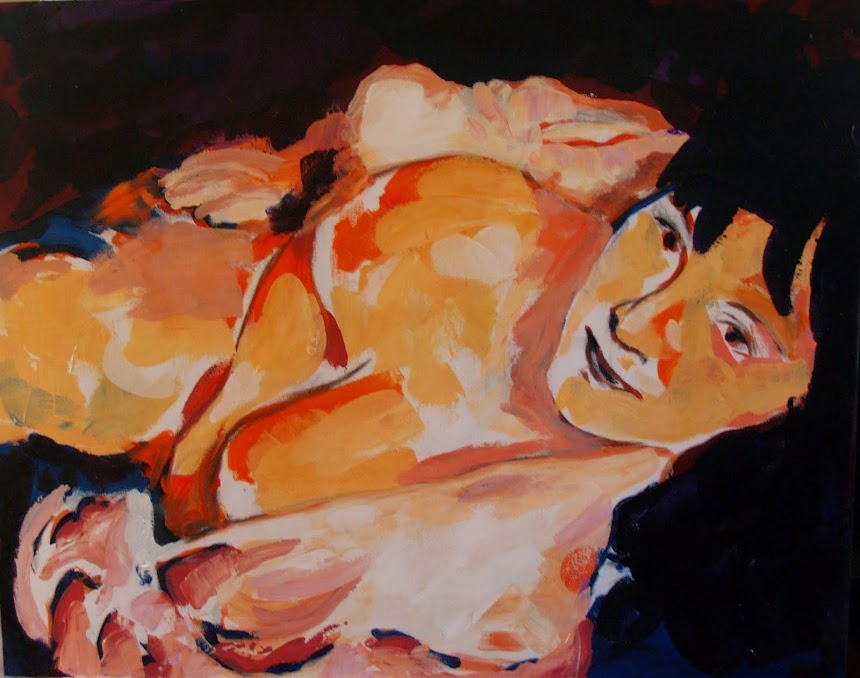She couldn’t help it. It was part of her. It wasn’t something
that she one day decided to do or something that she could turn on or off. All
her life, people had told her to just ignore it. You couldn’t just ignore it.
It was distracting. People were distracting. It wasn’t a simple thing to walk down
to the shops for a newspaper. She liked to wear smudged sunglasses and an old
cap low on her head to avoid any unwanted attention from people. She mostly
wore drab grey loose clothing. Her eyes looked only a few steps ahead so she
didn’t actively walk into someone. That would be the worst. Catching someone’s
eye or having to engage in conversation was bad enough. Physical touch was too
much.
She read somewhere that it had something to do with extra
links in the brain. Doctors had wanted to study her brain but she had no
interest in submitting herself to endless rounds of tests and scans. Letting
her body go into one of those huge expensive machines wasn’t part of her plan.
Not that she really had a plan. Her plans usually went as far as what work and
other obligations she had that week. Family birthdays, sure, were kind of hard
to get out of but she avoided appointments where possible. She hadn’t been to
the dentist in five years and had started to worry if that sensitivity in her
top right teeth was actually a problem. The thought of someone’s hands in her
mouth was more than she could bare.
Who knows what the dentist or their assistant would taste
like? Thirty year old carpet, skin that has spent too many hours in the sun all
sweaty and salty or over-heated milk sickly sweet and sour. They never tasted
like warm cherry pie or straight from the oven chocolate cookies. With all of
the possible tastes in this world, why was it that she encountered more
unpleasant than pleasant ones. Did other taste synesthetics experience the same
thing? She didn’t know anyone else with her gift so couldn’t answer the
question.
She’d never met another taste synesthetic. She first learned
the term when she was a teenager. Wikipedia and internet chat rooms were her
salvation. A doctor had declared his diagnosis one day after years of visits. Lexical-gustatory
synaesthesia to be precise. As a baby, the notes on her Maternal Child record
book noted that she had been ‘failing to thrive’. Her mother had always fussed
over her poor eating habits as a child and hoped that things would improve when
she started school. Surely her peer group would provide a positive influence.
They didn’t.
She was petit and
found it easy to fade into the corners. At recess and lunch time she managed to
appear occupied with packing up classroom activities, tidying her desk or taking
a trip to the bathroom. Her teachers never seemed to notice that she spent more
time unpacking her individually wrapped lunch items than she did consuming them.
The crackers and the carrot sticks had to be in separate
containers. Cheese slices had to be a particular brand and kept cool. Cross
contamination and possible food spoilage were easy excuses for food to be put
in the large round file in the corner of the classroom. Other kids turfed their
dry crusts and browned apple cores amongst the scrunched waxed paper and
plastic scraps. Gretel became adept at hiding her mother’s homemade treats in
between the foil and brown paper bags of the class’ detritus.
After school she would retire to her room and sit with her
favourite blanket under the desk that her mother had kept from her own
childhood. Her mother envisioned the little girl at the desk reading her beloved
books saved from her own childhood, cutting and gluing artistic creations or
drawing grand designs on endless supplies of paper. Instead, Gretel would sit
leaning against the wooden desk, with the afternoon sun streaming through dusty
net curtains onto her legs until she succumbed to snooze-land.
Her mother was grateful that Gretel didn’t come home from
school and plop in front of the TV like other children she knew. She assumed
that the school day exhausted her sweet little girl. Gretel lacked energy
partly due to her lack of food consumption but also because she found
interaction with other people so energy zapping. They were too stimulating, too
distracting, too much. She couldn’t watch TV or go to the movies. All those
people, all those words and sounds each with their own taste. Everything got
too much. One would be lid ice-cream, another would be defrosted bread,
synthetic maple syrup, damp grass, raw potato, and ear-wax or week old kitty
litter.
She could understand the appeal of texture and temperature
when it came to food but flavour as embodied in food was a foreign concept to
Gretel. She would taste flavours thousands of times a day and so didn’t
experience hunger as others did. Flavour went beyond sweet, salty, sour, bitter
and umami. She had tried and failed to describe the taste of vinyl car
upholstery after hours in the sun. Oily, sweaty and flaccid went only part way
there. It was also earthy and sweet with a lingering hint of musty leaves. It
was only the recurrent grumble of her stomach and weakness in her limbs that defined
hunger for Gretel.
Her sixth grade teacher had tasted of vanilla ice cream. Mr
Whitehall gave her a brain freeze. She found it difficult to concentrate as she
held her head back, pressed her tongue to the roof of her mouth and covered her
mouth and nose with her hands. WikiHow users voted these the most effective
methods for dealing with brain freeze. She wasn’t so sure.

